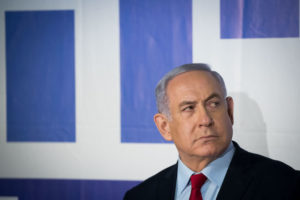Meet the World’s Last, Best Hope to Prevent Israel’s Annexation of the West Bank

French President Macron
Abe Silberstein and Daniel J. Solomon write in Haaretz, “Israel’s election last week extinguished one of the last glimmers of hope for the country’s beleaguered center-left. Prime Minister Benjamin Netanyahu cruised to a fifth term and will, in the coming weeks, likely assemble a coalition government that promises to be ever more vociferous in its assault on the country’s democratic institutions and its refusal to come to fair terms with the Palestinians.
The drift to the right we’ve grown accustomed to decrying in the past decade could turn into a determined sprint during the next government. Netanyahu vowed in the closing days of the campaign that, if successful, he would move to annex at least parts of the West Bank. This would have seemed a far-fetched proposition not so long ago, but now is a uniquely propitious timing for Israel’s far-right.
Netanyahu benefits from an enabler in Washington, D.C., whose gifts have included the relocation of the American embassy in Israel to Jerusalem, recognition of Israeli sovereignty in the Golan Heights and, despite opposition from the Joint Chiefs of Staff, naming Iran’s Revolutionary Guards to the list of Foreign Terrorist Organizations. Secretary of State Mike Pompeo pointedly refused to say last week if the U.S. would oppose West Bank annexation, and failed to offer a legal basis for the Golan’s annexation that the Trump administration already recognized.
Meanwhile, Arab states in the region, once a strong bulwark of support for Palestinians (at least in words), have no interest in pressuring Israel, with whom they are tacitly aligned against Tehran. Now that Washington has shed the pretense of honest broker and the Arab world has dropped its sops to the Palestinians, who will thwart the train headed for annexation?
Not the United Kingdom, consumed with the herculean task of Brexit. Not Germany, given the burden of its history. Russia is carrying too much regional baggage to even attempt that. And China is too smart to wade into this morass.
That leaves France as the last, best hope for preventing annexation. And under President Emmanuel Macron, the Gallic republic has a shot at averting this disastrous move – and perhaps even the motive, means and opportunity to advance regional peace. France occupies a seat on the U.N. Security Council and often serves as host for weighty treaty negotiations, including most recently the Paris climate accord. During the post-war era, France has also maintained a unique approach to international relations.
While Britain and West Germany became American client states in the ‘40s and ‘50s, France – under former President Charles de Gaulle – pursued an independent foreign policy as part of a “politique de grandeur.” At his direction, the French even pulled out of full military cooperation with NATO in the 1960s.

Benjamin Netanyahu seen after delivering a statement to the media at the Prime Minister residence in Jerusalem on March 20, 2019.
This maverick streak has persisted into the present.
The French memorably, and rightly, torpedoed U.N. support for the Iraq war. Under former President Francois Hollande, the country intervened in Mali, a war-torn ex-colony that had been besieged by Islamist rebels.
This last police action – undertaken at the request of Mali’s government – is one sign of how deep France’s ties with its former colonies in North Africa and the Middle East run. These connections could prove critical in convincing Arab powers to do more than issue wan and perfunctory protestations in the event of Israel’s ineluctable decision to extend its sovereignty to the West Bank.
France also holds some leverage over Israel. As a member of the European Union, France could help or hinder the Jewish state’s efforts to pursue tighter economic and political cooperation with the E.U. Despite the posturing of some right-wing politicians in Israel, the E.U. remains Israel’s largest trading partner, and an ally too big to lose.
French intervention in the conflict would not be a mere matter of altruism: France has much to gain in scuttling a political development that could spark bloody clashes not only in the Middle East, but within French territory itself.
Relations between the country’s Jewish and Muslim communities – the largest in Europe – have long been strained. The French colonial experience informs this tension, but so too does the situation in the Middle East.
Whenever flare-ups occur in the West Bank or Gaza, France witnesses spikes in anti-Semitic hate crimes – most of them carried out by Muslim youths of North African descent. This trend is so pronounced – borne out in national racism incident statistics – that Hollande once warned of the “importation” of the Israel-Palestine conflict into French politics and society.
Anti-Semitic acts sow fear among French Jews, harm the sense of vivre-ensemble (coexistence) the state hopes to foster, which then stokes bias against the wider Muslim community. Such incidents also do severe damage to France’s international prestige, contributing to the misperception that French society is singularly hostile to Jews. Reaching a settlement to the conflict might bring peace not only to Israel-Palestine but to the streets of France as well.
France in the role of Middle East mediator has been floated before. Hollande sought to forward a two-state solution, and even held an international peace summit in Paris two years ago. His ideas came to naught – coming at the end of his tenure and dismissed by the Obama administration.
Macron now finds himself in a much more favorable position, with three years left in office and faced with a White House that has no credibility on this matter. He said last October that he would issue his own peace plan in the absence of American parameters. Perhaps the time has come to wipe the dust off that idea.

Hundreds of Palestinian, Israeli and international protesters march in Hebron to demand the end of settlements and segregation in the city, Feb. 22, 2019
Macron has also now emerged from his own domestic crisis in the form of the gilets jaunes, or Yellow Vest, protests. The movement has largely dissipated and his poll numbers are on the rebound. He must now graduate from grand gestures and saute le pas – take the plunge, using France’s relative might to head off the reckless designs of Israel’s government.
If not Macron, then whom? And if not now, well – there might not be a later, if a new Israeli government moves forward with annexation.” This article is printed in its entirety.
